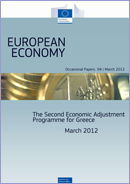 |
 |
|
|
|
|
 |
 |
 |
 |
Greece gets first payment out of second adjustment programme
According to the Memorandum of Understanding of 14 March between Greece and the Commission acting on behalf of the euro-area Member States, the Greek government would put in place a mechanism that allows better tracing and monitoring of the official borrowing and internally-generated funds destined to service Greece's debt. This mechanism was activated on 20 March as the EFSF paid, on behalf of the euro area Member States, the first disbursement of EUR 4.9 billion. This amount, in support of the second economic adjustment programme for Greece, serves to cover maturing bonds held by the European Central Bank. It represents the bulk of the first instalment of EUR 5.9 billion that was credited to Greece on Monday, 19 March. Along with the tranche from the euro area, Greece also received some EUR 1.6 billion from the contribution of the International Monetary Fund.
|
 |
 |

The work of the Troika focuses on assisting Greece in rebalancing and restructuring its economy and in improving medium-term opportunities for employment and growth. Let me stress these words: employment and growth. These are the principal objectives of the economic reform programme of Greece.
Olli Rehn, European Commission Vice-President and Commissioner for Economic and Monetary Affairs and the Euro |
 |
 |
|
|
|
|
 |
|
 |
 |
 |
 |
 |
 |
Economic sentiment weakens in the EU but remains broadly stable in the euro area
After improving in January and February, the Economic Sentiment Indicator (ESI) decreased in March by 0.8 points in the EU and by a marginal 0.1 points in the euro area, to 93.2 and 94.4, respectively. The decline was mainly driven by decreasing confidence in the industry and construction sectors. By contrast, confidence increased among consumers and in the services and retail trade sectors. Among the largest Member States, the UK reported the biggest decrease (-2.5) in sentiment, followed by Germany (-2.4), the Netherlands (-1.3) and Spain (-1.1). On the other hand, sentiment improved in Italy (+3.5), Poland (+2.2) and France (+2.0). The ESI is above its long-term average only in Germany.
|
 |
|
 |
 |
 |
|
 |
 |
 |
 |
 |
 |
Reports highlight Basel III rules for emerging markets and resolution of non-performing loans to aid recovery
On 28 March, the European Bank Coordination "Vienna" Initiative released two reports, one on Basel III and one on non-performing loans. The reports, which were prepared by dedicated working groups over the course of a full year, were discussed and adopted at the full forum meeting held in Brussels on 12-13 March 2012. The first report on Basel III highlights the implications of the Basel III rules for Central and Eastern Europe, and emerging markets in general. More specifically, it offers recommendations on how to address capital and liquidity requirements. The report points out that future regulation and calibration should take better account of the emerging market perspective and market development needs. The second report on non-performing loans finds that possibilities exist for stimulating the resolution of non-performing loans in order to support recovery. The report calls for a pro-active, cooperative approach to dealing with non-performing loans, with distinctive roles for each stakeholder.
|
 |
|
 |
 |
 |
|
 |
 |
 |
 |
 |
 |
EU uses Regional Development Fund to guarantee up to EUR 1 billion worth of loans for Greek enterprises
To further boost growth in Greece, on 21 March the EU launched a new Guarantee Fund for Greek Small and Medium-Sized enterprises (SMEs). The new facility, agreed in cooperation with the European Investment Bank (EIB) will help SMEs that have been hardest hit by the crisis to access credit, by providing Greek banks with sufficient liquidity. This in turn will help Greece to optimise the use of EU Structural Funds: some EUR 500 million from the European Regional Development Fund (ERDF) will guarantee loans totalling up to EUR 1 billion to SMEs via partner banks in Greece. The latest initiative comes on top of a number of financial tools designed to boost the Greek economy through the end of 2015 including over EUR 4 billion in financing for SMEs (including expected leveraged financing). The Commission has already made it possible temporarily for Greece to use an increased co-financing rate of up to 95% of the EU contribution for the financing of projects with structural funds.
|
 |
|
 |
 |
 |
|
 |
 |
 |
 |
 |
 |
Euro exhibition in Funchal, Madeira
After successful stops in nine Member States, the European Commission's travelling euro exhibition has arrived in Funchal, the capital of Portugal’s Autonomous Region of Madeira. The exhibition not only informs visitors about the production of banknotes and their security features, but also shows the history of the euro, the benefits of the Economic and Monetary Union (EMU) and the latest developments in the euro area such as the EU's response to the economic and financial crisis. Visitors can use interactive touch screens and audiovisual features. After winding up in Funchal on 17 April, the exhibition will be shown in Bruges, Belgium from 26 May to 30 June 2012.
|
 |
|
 |
 |
 |
|
 |
 |
 |
 |
 |
 |
EU acts on shadow banking to remove new sources of risk in the financial sector
The Commission has opened a new chapter in its ambitious regulatory reforms of the financial sector. On 19 March, it issued a consultation in the form of a Green Paper on the subject of shadow banking. Shadow banking is a growing area of non-bank credit activity that has so far not been a prime focus of prudential regulation and supervision. In response to invitations by the G20 in Seoul in 2010 and in Cannes in 2011, however, the Financial Stability Board (FSB) is in the process of developing recommendations on the oversight and regulation of these entities and activities. With its Green Paper, the Commission is participating actively in the FSB work. Shadow banking can perform important functions in the financial system, but it can also pose potential threats to long-term financial stability because unknown sources of risk accumulate in the financial sector and may spill-over to the regular banking sector.
|
 |
|
 |
 |
 |
|
 |
 |
 |
 |
 |
 |
Commission proposes new rules to boost protection for posted workers
As a source for economic growth and to make the EU Single Market work better for workers and for business, on 21 March, the Commission proposed new rules to increase the protection of workers temporarily posted abroad. Findings suggest that minimum employment and working conditions, such as for pay and holidays, are often not respected for the one million posted workers in the EU. To remedy this situation, the Commission has put forward proposals as part of an Enforcement Directive aimed at increasing monitoring and compliance and improving the way existing rules on posted workers are applied in practice. This will not only help workers, it will also ensure a level playing field between the businesses involved. Being able to temporarily post workers abroad enables companies to offer their specialised services throughout the EU Single Market, contributing to greater efficiency and economic growth. The proposed Enforcement Directive aims to improve the way the 1996 Directive on the posting of workers is applied in practice, without changing its provisions.
|
 |
|
 |
 |
 |
|
 |
 |
|
 |
 |
 |
 |
 
|
 |
The Second Economic Adjustment Programme for Greece - March 2012, European Economy, Occasional Papers 94
This report discusses progress by Greece in the context of its economic adjustment programme. It is based on the findings of a joint Commission/ECB/IMF mission that met the Greek authorities in Athens between 17 January and 9 February 2012. The report assesses compliance with previously agreed requirements, and elaborates on the policies agreed upon between Greece and the Commission, ECB and IMF staff teams as Greece shifts to a second programme of financial assistance.
The document contains in annex the updated programme documents and Memorandum of Understanding.
|
 |
|
 |
 |
|
 |
 |
 |
|
 |
 |
 |
|
 |
 |
 |
|
 |
 |
Directorate-General for Economic and Financial Affairs |
|
|
|
 |
|